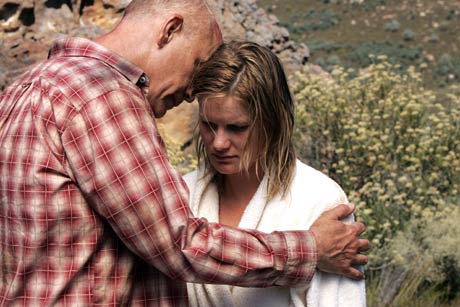Based on J.M. Coetzees Booker Prize-winning novel, Disgrace is an incredibly bleak tale set in post-apartheid South Africa. The protagonist is David Lurie (John Malkovich), a professor of Romantic poetry at a Cape Town university. He is a creepy, unlikeable character who sexually preys on one of his students and leaves his job unrepentant once the scandalous affair is discovered.
He heads to the country to stay with his daughter Lucy (Jessica Haines), a recently single lesbian who runs a dog kennel and vegetable garden with the help of a worker named Petrus (Eriq Ebouaney), who lives on her land. When David and Lucy suffer a brutal home attack at the hands of three local youths, both are devastated. David wallows in an impotent rage, not comprehending how Lucy pragmatically seeks to rebuild her life at the expense of seeking justice on the attackers, one of whom comes to live with Petrus.
The film is an unrelentingly depressing portrayal of present-day South Africa, wherein brutality is tolerated as inevitable and humanity is sacrificed for the sake of co-existence. John Malkovich does a good job with a difficult character, not shying away from his unpleasant nature and finding moments of humility towards the end, though sometimes the film verges on enjoying Davids sexual pathology and arrogance, which leaves a bad taste.
Jessica Hainess likeable Lucy brings a much needed balance, tolerating her father not without love while challenging his misogyny and outdated thinking. The film certainly presents some interesting ideas about the complex nature of forgiveness and reconciliation in the wake of monumental brutality, and can be taken as a metaphor for the larger political situation. But it remains pretty difficult to sit through in its unending hopelessness.
(Sherman)He heads to the country to stay with his daughter Lucy (Jessica Haines), a recently single lesbian who runs a dog kennel and vegetable garden with the help of a worker named Petrus (Eriq Ebouaney), who lives on her land. When David and Lucy suffer a brutal home attack at the hands of three local youths, both are devastated. David wallows in an impotent rage, not comprehending how Lucy pragmatically seeks to rebuild her life at the expense of seeking justice on the attackers, one of whom comes to live with Petrus.
The film is an unrelentingly depressing portrayal of present-day South Africa, wherein brutality is tolerated as inevitable and humanity is sacrificed for the sake of co-existence. John Malkovich does a good job with a difficult character, not shying away from his unpleasant nature and finding moments of humility towards the end, though sometimes the film verges on enjoying Davids sexual pathology and arrogance, which leaves a bad taste.
Jessica Hainess likeable Lucy brings a much needed balance, tolerating her father not without love while challenging his misogyny and outdated thinking. The film certainly presents some interesting ideas about the complex nature of forgiveness and reconciliation in the wake of monumental brutality, and can be taken as a metaphor for the larger political situation. But it remains pretty difficult to sit through in its unending hopelessness.
